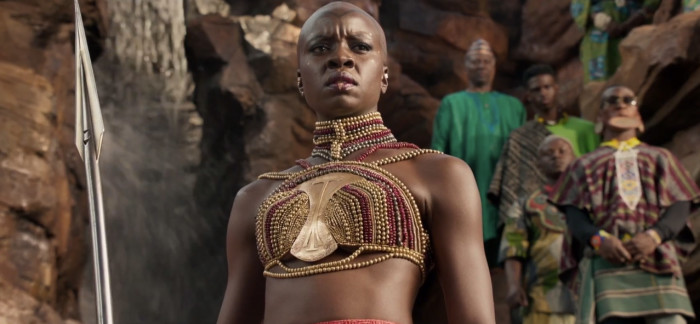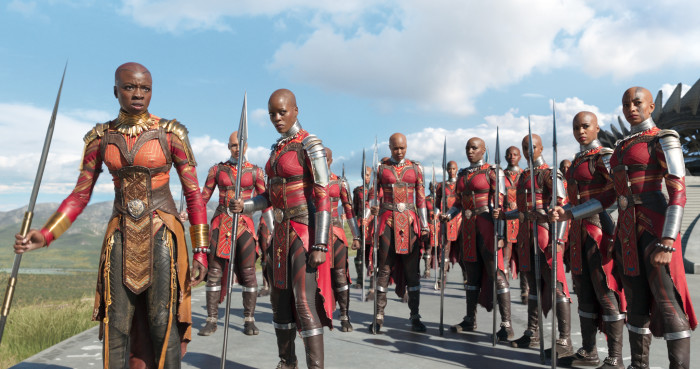'Black Panther' Is Not Merely A Moment – It's Here To Stay
(Welcome to The Soapbox, the space where we get loud, feisty, political, and opinionated about anything and everything. In this edition: Black Panther is a film that celebrates blackness...and that should become the new normal.)
For some, the Black Panther movie may be a new phenomenon, a perhaps radical showcase of black talent in which both the men and the women are centered equally — and where they stand tall like royalty as accolades continue to pour in far and wide. It's supposedly an anomaly, a moment to celebrate. And that it is; an important example of black excellence taking center stage.
The red-carpet presentation at its January premiere was by itself a sight for sore eyes, black decadence at its finest, accessorized with deep hues and pops of gold. It was that rare mainstream occurrence in which our beauty literally radiated in a space historically dominated by the likes of Greta Garbo, John Wayne, and Frank Sinatra. And finally, FINALLY, others saw in us what we've seen in ourselves since the dawn of time.
I'm hanging on to this because I don't want it to go away. I don't want this time to slip through our fingers after we have finally garnered the attention we've deserved for too long. Right now, the fanboys are praising the film's badassery. And the feminists are coming out in droves showing their support for "a job well done." But as they champion this "moment," it's important to allow black and brown voices to shine — the comic book nerds, journalists, and women of color who for too long have gone ignored and underrecognized in pop culture. It's our time to not just support the conversation but lead the conversation, be the conversation. It is our voices that you should be included on the radio and on TV when media want to bring in "experts" to discuss the film. At the very least, we should finally be shown the respect of being called "critics" and not simply "fans" (I've seen it happen too many times before).
If the fact that the movie stars, and is directed, written, and costumed by black people — and is about black people — isn't proof enough that this is something that we created and that is ours, then I don't know what is.
In fact, let's think about that for a second. The fact that Black Panther exists at all is our feat alone, an opportunity that we gave ourselves as it was not going to be offered to us. During this age of Trump, who once called places largely occupied by black and brown people, including Africa, "shitholes," this movie in and of itself is a revolutionary act. So, we refuse to be marginalized in our own story or have the control of the narrative (of both the film and the discussion around the film) snatched out of our hands.
 Black Panther is being hailed for its diverse cast, and it's coming out during the #TimesUp movement, which aims to center and amplify women from various cultural and economic backgrounds in the Hollywood narrative. It's timely, maybe even considered trendy. But let's be clear: this is specifically a black movie that celebrates the strength and beauty of black womanhood in an era in which both get tossed aside. The film's women are not merely strong; they're warriors. It is a statement that qualifies — and will undoubtedly monetize — black history and experiences in a way that white Hollywood has been doing on our behalf since its beginning.
Black Panther is being hailed for its diverse cast, and it's coming out during the #TimesUp movement, which aims to center and amplify women from various cultural and economic backgrounds in the Hollywood narrative. It's timely, maybe even considered trendy. But let's be clear: this is specifically a black movie that celebrates the strength and beauty of black womanhood in an era in which both get tossed aside. The film's women are not merely strong; they're warriors. It is a statement that qualifies — and will undoubtedly monetize — black history and experiences in a way that white Hollywood has been doing on our behalf since its beginning.
But this is not a fad, at least it should not be. This sentiment of celebrating blackness and black and brown talent on the big screen should not be a fleeting moment. It should go beyond Black Panther and echoed for non-comic book and non-blockbuster movies as well. Black independent movies have been killing the game for years now, highlighting a variety of black experiences and narratives that are often overlooked on the big screen. Just this year alone, we have films like Sundance darling Sorry to Bother You, The Hate U Give, and If Beale Street Could Talk coming out that are led by black casts and filmmakers that deserve the same attention. In other words, #blackstoriesmatter should be more than just a hashtag; it should be a mandate that we needn't have to remind people of. These narratives matter across the board, not just when it's trendy or when they come gift wrapped inside a major comic book film.
If you think about it, it really shouldn't be that hard to do. Praise for white independent films like Three Billboards Outside Ebbing, Missouri and Dunkirk have garnered an overwhelming amount of praise — and multiple Oscar nominations. We hail films that aren't necessarily in the conversation around the water cooler, or inspire toys and merchandise, all the time without even thinking about how contrary they are to the mainstream. Why not give their black counterparts the same respect? During this time when women of color have too often been relegated to the peripheral of modern women's movements, celebrating and intentionally seeking narratives in which women of color are at the center is an urgent act that should not need any encouragement.

But here I am anyway, encouraging the bare minimum — to see us, praise us, and watch in awe as Black Panther fiercely dominates your social media feeds, pop culture rhetoric, and most likely any situation that calls for cosplay (including the Halloween party you'll attend this year). Normalize the act of supporting and uplifting black beauty, black womanhood, black affirmation, and black talent not because you're asked to; because it deserves to be.
2018 will bring a variety of black narratives, including the star-studded A Wrinkle in Time, that will provide yet more proof that blackness on the big screen are not going anywhere. In fact, they're multiplying as they steamroll their competition and solidify their place in the pop culture canon. And while one Black Panther has defiantly become centered in the mainstream in a spectacular superhero film, this is neither the beginning nor should it be the end of its phenomenon.
Embrace it. Honor it. Endorse it. Because that is what it means to be a true ally.
